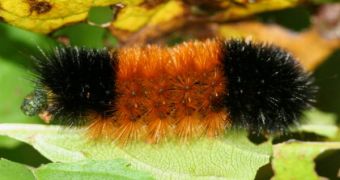University of Arizona researchers managed to demonstrate for the first time that even insects have the ability to self-medicate, as in to consume various compounds found in plants or other places, in order to rid themselves of infections, parasites, bacteria or other “health issues.” The experiments, conducted by lead author Elizabeth Bernays, showed that woolly bear caterpillars, the larvae of the furry moths, can eat certain types of leaves when they become infected with parasites, thus curing themselves.
Although these caterpillars are fairly small, each spring, they a under attack from gruesome predators that are even smaller than they are, namely certain species of parasitic flies. These tiny insects lay their eggs within the caterpillars, which then face a cruel faith. If the don't do anything to save their own lives, the eggs will hatch inside them, and then the tiny flies will eat their internal organs, until they finally burst out of the larva's belly.
In order to avoid this outcome, the caterpillars have developed a strange response, in that they start consuming semecio and other plants, whose leaves are laden with a group of drugs called alkaloids. To get an idea, the human equivalents for this class of substances would be caffeine, morphine and cocaine. Researchers are not yet sure how the stuff works inside the larvae, but the thing is that the parasitic flies no longer hatch inside their hosts, and the caterpillars live.
In order to get a better view of this behavior, the research team deliberately infected a group of the woolly bear larvae with parasitic flies, while another was kept completely safe. While the latter went about its business with no concern for the future, the former ate as much alkaloids-laden leaves as possible. The former exhibited no preferences as to the leaves eaten.
Insects such as the woolly bear caterpillar “have a system that's based on changes to their taste system, rather than the cognitive ability of their brains,” said the lead researcher, who published the details of the new study in the latest issue of the journal PLoS One. Because of this ability, they can sense the fact that they need to consume more alkaloids through changes in the way they experience regular food, the team concluded.

 14 DAY TRIAL //
14 DAY TRIAL //